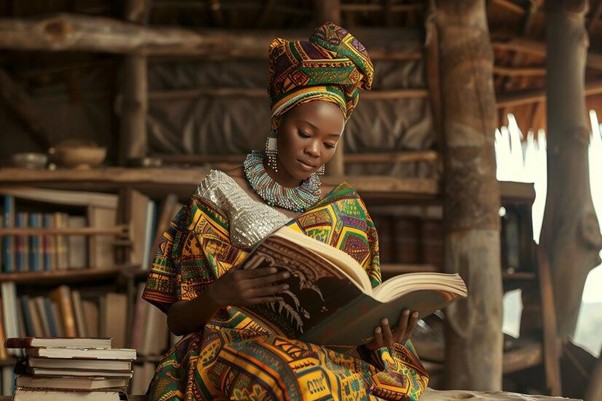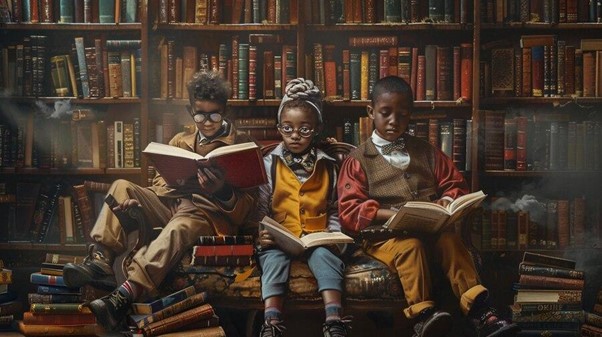The Role of Novels in the Nigerian Educational Process: How Literature Shapes the Future
Imagine a classroom in Nigeria. The air is filled with anticipation as a teacher opens a well-worn copy of Things Fall Apart. The students, eyes wide, listen intently to the tale of Okonkwo, a fictional character whose struggles mirror the deep cultural changes that their ancestors may have faced. Novels like these are more than […]

africa woman reading
Imagine a classroom in Nigeria. The air is filled with anticipation as a teacher opens a well-worn copy of Things Fall Apart. The students, eyes wide, listen intently to the tale of Okonkwo, a fictional character whose struggles mirror the deep cultural changes that their ancestors may have faced. Novels like these are more than just stories. They are tools. Tools that sharpen young minds, broaden perspectives, and shape the way the future leaders of Nigeria will think and act.
The Power of Fiction in Education
Why novels? What makes fiction, in particular, so crucial to the educational process? In Nigeria, where the educational system grapples with challenges such as overcrowded classrooms, outdated materials, and insufficient resources, literature—especially novels—provides an affordable and accessible means of delivering lessons that go beyond textbooks.
Stories have a way of making abstract concepts concrete. Emotions, history, and cultural traditions are oftenBetter captured through stories than bare facts. Novel reading isn’t about passively receiving information – it’s an active experience where we enter characters’ lives, confront their choices, and traverse the distinct landscapes that contextualize their journeys. Nigerian students can uncover the lingering effects of colonization, marvel at their country’s hard-won independence, and debate the persisting clash between time-honored customs and modern ideals through the lens of fiction. Understanding Nigeria’s past means grappling with these key themes, and only then will its people be able to chart a course for the years ahead.
Novels as Mirrors and Windows: Shaping Cultural Identity
In a nation as diverse as Nigeria, with over 250 ethnic groups and numerous languages, novels offer a unique opportunity to foster cultural understanding and cohesion. Literature can serve as both a mirror and a window. For many Nigerian students, novels reflect their own experiences, their language, and their culture. When they read books by Nigerian authors, they see their lives and their struggles echoed in the characters. This reflection helps solidify their identity. It gives them pride and ownership of their narrative.
In a 2022 survey conducted by the National Bureau of Statistics, 67% of Nigerian students from secondary schools reported that reading novels expanded their understanding of different cultures within their country. It could be a story reading app or a printed book, it doesn’t matter. Plus, students can better understand the intricacies of relationships, especially enemies-to-lovers romance books with their intricately intertwined relationships between characters. While reading novel apps and books may have the same effect, apps like FictionMe offer a much larger library than physical local libraries.
Literature and Critical Thinking: The Cognitive Benefits of Fiction
Reading novels is not just about absorbing stories. It’s a detective’s game, really – unraveling the emotional threads, reading between the lines of character motives, and piecing together the story’s puzzles. Education’s most prized possession is critical thinking, the superpower that helps students separate fact from fiction. Classrooms often get stuck in a sea of facts and figures, but novels come along and Suddenly, students are faced with the thrill of analyzing ideas and imagining their own stories. They don’t just ask, “What happened?” but “Why did it happen?” and “How could it have been different?”
Incorporating novels into the curriculum helps students develop these cognitive skills in a natural, engaging way. The twists and turns of a well-crafted plot keep students on their toes, fostering curiosity, problem-solving, and even ethical reasoning. When students read Half of a Yellow Sun by Chimamanda Ngozi Adichie on Fiction Me, for example, they aren’t just learning about the Biafran War. They are also grappling with questions about loyalty, survival, and the cost of independence.
In a study from the University of Ibadan, students who regularly engaged with fiction scored 20% higher in critical thinking assessments compared to their peers who primarily focused on non-fiction texts. This suggests that novels can enhance cognitive abilities that are essential for success in both academics and life.
The Emotional and Social Impact: Novels Build Emotional Intelligence
While Nigeria continues to produce some of the brightest minds in Africa, one area often overlooked in the educational process is emotional intelligence, which is closely tied to emotional health. Understanding and managing emotions, both in oneself and in others, is key to success in life, no matter the career path. Novels are an excellent way to cultivate this type of intelligence.
Through fiction, students engage with characters in distress, love, anger, or joy. They see how emotions drive decisions and actions. They feel the weight of loss, the rush of hope, and the sting of betrayal. By the time they finish a novel, they’ve lived through a range of emotions without leaving their classroom. This exposure helps build emotional intelligence, which is crucial in fields like leadership, business, healthcare, and beyond.
For instance, novels that deal with themes like poverty, inequality, or discrimination can spark important discussions on empathy and fairness. Purple Hibiscus by Chimamanda Adichie deals with domestic violence and religious tension, pushing students to reflect on these sensitive issues in a safe environment.

Challenges and Solutions: Maximizing the Role of Novels in Education
Yet, despite the clear benefits, the integration of novels into the Nigerian educational system isn’t without its challenges. One major obstacle is access. In rural areas, where educational resources are scarce, obtaining novels can be difficult. Many schools lack libraries, and purchasing books is often not feasible for families struggling to meet basic needs.
One solution could be increased government investment in digital libraries. Imagine a Nigeria where students from urban Lagos to rural villages can delve into the world of literature with ease – thanks to the ubiquity of smartphones and the internet, e-books are poised to make this vision a reality. Imagine sparking meaningful conversations about plot twists, character motivations, and social commentary – that’s what happens when students gather in book clubs, propelled to think critically about the books they’re reading.
Conclusion
In conclusion, the role of novels in the Nigerian educational process is profound and multi-dimensional. They are tools that build cultural identity, foster critical thinking, and develop emotional intelligence. They bridge the past and the future, local realities and global perspectives. By investing in literature, Nigeria is investing in the minds of tomorrow’s leaders—shaping a generation that will not only be knowledgeable but also empathetic, critical, and culturally grounded.
